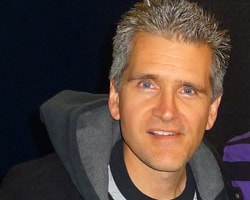|
I'm not even sure if anyone's following this blog anymore. I've been terribly negligent with it for far too long as I've focused on my freelance gigs. A recent invitation to read my writing at Central Washington University, however, has woken me up to the fact that I've gotten far too sidetracked by those quick-paying gigs.
So, I've gotten back to work on my novels and am going to spruce up this primitive-ass website. I'm writing this post more as a way to commit myself to this course of action than anything else. Taking things to the next level and all that shit. Maybe I'll get blog readers back, too. We'll see. Onward!
0 Comments
Clay
Clayton bolted for the wood-line. He made it halfway there when the compound’s floodlights flicked and exposed his escape. He kept running. No other option was left. Capture would mean only one thing for him now. He crashed headlong through a wall of evergreen branches. Inside the woods, the forest canopy blocked out all moonlight and engulfed him in darkness. He ran on blind. A voice spoke calmly but sternly over loudspeaker behind him. “Flash red,” the voice on the loudspeaker said. “Flash red.” Clayton knew that at that very moment the others would be pouring out of the compound and flooding into the woods to find him. He knew because he’d been on the other side before — too many times. “Clayton,” the loudspeaker voice said, “we’re coming for you, son. Don’t be scared. Just hold where you are and we’ll find you.” Clayton hesitated. For two months he’d obeyed every word uttered by that voice, and the impulse remained ingrained strongly within him. That’s why you have to escape, a dim internal voice reminded him. That dim voice was all that was left of his actual self, he realized. Trees blurred by him. Braches and brambles cut his face and tore open his grey gown. Many times he fell, got up, and ran some more. Flashlights cut through the forest behind him. Voices called his name. He’d started with a particular direction in mind, but soon he was lost in the woods, simply running in the direction away from the forces following him. After half an hour of frantic flight, he miraculously found himself breaking out of the woods and into the back lot of an abandoned gas station. Moonlight glinted faintly off a phone booth situated on the far side of the parking lot, near a winding road. Clayton took off his shoe and dumped out the change he’d been secreting there under the sole of his foot for four days. From off in the distance came the roaring of a pickup truck driving closer to his position. The flashlights hunting him in the woods brightened. He didn’t know if the phone in the booth was functioning, and he’d have minutes at most to make a call, even if it did. Probably only seconds. No choice left, he reminded himself. There’d been no choice left from the moment he’d made his break for the woods. Clayton gripped the change in his hand and sprinted for the phone booth. Jim Jim was just taking the redhead’s bra off when his cell phone rang on the nightstand. The next morning he wouldn’t even be able to remember the woman’s name. That was the thing that would come to haunt him the most — he betrayed his little brother for a Tinder hookup whose name he couldn’t even remember less than twenty four hours later. She was a nice person. Truth be told, Jim liked her a lot. Her name was Carrie, even if he couldn’t remember it. She gave him one of the best nights he ever had. Recently divorced, Carrie had a sweet smile and a playful innocence about her — the sort of innocence that a woman wills into herself after enduring hard experience. Jim had met a few women with that brand of defiant innocence, and they always left a long impression on him. Carrie didn’t say much about the details of her marriage, but there were enough hints for Jim to put the story together. He’d hit her at least a couple times and just generally not spoken well of her. She also liked poetry and ice cream, he’d recall. Strange the things that stick in our memory. With her bra tossed on the bed Carrie jokingly apologized for the imagined sagging in her breasts. Jim just laughed. “Are you kidding me? They’re beautiful.” Carrie laughed. She knew they were beautiful the whole time. Tinder hookups had become even more common than usual for Jim over the past couple of months. He’d never had trouble attracting women, being tall and well-built with dark features and olive eyes. Ever since he’d appeared in an episode of Danger Hunters two months prior, however, the women had been crazy for him. Carrie had been unapologetic in her quest to sleep with a TV star, and Jim had taken absolutely no offense to her using him like a “piece of celebrity meat,” as she put it. Jim ignored his ringing cell phone. It was Carrie who kept looking over at it. “That’s not your wife, is it?” Jim pulled her pants the rest of the way off as he looked over the phone. Clayton’s name was illuminated on the screen. “No, it’s just my screw-up brother. He probably smoked too much weed again or something.” Carrie laughed. Jim laughed, too. He forgot all about the call until the next morning as he was driving to the airport to pick up Rus Grossman, CEO of Ralph Marketing Associates and Jim’s biggest client yet. Even then he held off to listening to it until hearing that Grossman’s flight had been delayed. Sitting in his truck in the airport parking lot, Jim sighed and started the message, eyeing the sky for the incoming Alaska Airlines flight with his very wealth client sitting aboard. Jimmy, I’m in trouble, man, his brother’s voice said. Pick up the phone, man. Please. Jim’s face went slack and pale and the hand holding the phone slumped down so that it was no longer against his ear. Clayton had called him dozens of times for this or that problem, but the raw fear in his brother’s voice was apparent from the start. Jimmy, I’m scared. His brother sobbed. I’m in trouble, man. The sobs turned into a light cry. “Clayton, what’s wrong?” Jim shouted in his truck as though the message wasn’t from the night before — as if it wasn’t too late to do a damn thing. A loud engine became audible on the phone, followed by the sound of truck tires skidding to a hard stop in gravel. Then the sound of two doors being flung open and boots running over the ground. Clayton sobbed again, a sad, haunting sob of resignation. I’m sorry, Jimmy. I’m sorry, man. With that, the phone fell and clattered against something hard, as though dropped the ground. “Clayton!” Jim yelled pointlessly at the phone. Moment of silence on the other line. Jim couldn’t hear or anything, or at least couldn’t consciously identify what he heard, but he sensed the presence of someone picking up the phone. It was a very light breathing — not his brother’s breathing, but someone else’s. He didn’t know he knew that, but he did. Someone else was on the phone, listening. The call clicked off. Silence. Copyright 2018 Jeff Suwak  Image borrowed from Bravewords.com. Image borrowed from Bravewords.com. So, I often ask people who want to write, what are you an expert at? That’s the most important thing, because that’s the thing you’re going to have the most fun writing about. — Martin Popoff IntroductionEvery single day I feel grateful for having a paying side hustle in music journalism. Writing is never an easy dollar, and writing about music is an even harder dollar that most. So, after years of doing this, I still get a kick at every cent I earn. Martin Popoff, however, takes the whole thing to an entirely different level. He’s forged a path many would (and many probably do) envy. You wouldn’t know that from talking to him, though.
For nearly two decades, Toronto, Canada’s Martin Popoff hasn’t just made a full-time living with music journalism. He’s managed to do it almost entirely his way. He’s not out there scrapping for paid freelance gigs or staff jobs. Instead, he’s built a business foundation that allows him to make his daily bread writing about the music he wants to write about, in the way that he wants to write it. Along the way, he’s met his heroes, seen his books in print, and collected a whole lot of autographs. He’s won those coveted publishing deals so many of us writers hear legends about, and he’s constructed a viable self-publishing platform that provides the majority of his earnings. Millions of wage slaves would kill for a life writing about music, but Popoff doesn’t come across as arrogant or entitled whatsoever in conversation. He’s honest and straightforward about how hard he has to work to make it happen, and about how art often has to be sacrificed for efficiency. He doesn’t talk about his craft like some hoity toity artiste, as you might expect. He talks more like a mechanic — practical, no-nonsense, and humble. I’m probably something of an anomaly in that I didn’t get into music journalism because of musicians or even music, necessarily. I got into music journalism because of music journalists. Namely, the great crawdaddy himself Paul Williams showed me the kind of quality writing that could be done in this field. I’m a writer at heart, not a musician, so I’ve always looked up to writers first and foremost. That may be why I actually got a bit nervous for this interview. I stopped getting nervous talking to musicians a long time ago. This one, though, zapped me a little bit. It caught me off guard, and I felt like I flubbed a golden opportunity. Luckily, Popoff was easy going and happy to share his wisdom. I actually interviewed him once before, for his release of Rush: Album by Album. That one was a written interview, though. This time, I scheduled our talk entirely too early in an attempt to accommodate the time difference (one more reason things didn’t go exactly as planned) and chatted with him one-on-one on the phone. Luckily, Popoff picked up the slack and dropped some useful wisdom for all those looking to make their way with music journalism. Continued at https://medium.com/p/c6c5e1e5d577/edit |

 RSS Feed
RSS Feed
